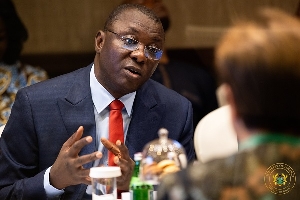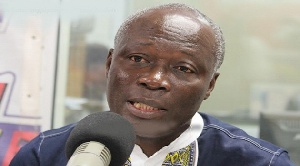The Minister of Finance, Dr. Mohammed Amin Adam, has reassured investors of the government’s proactive approach to tackling the challenges within the energy sector, with a specific focus on the electricity sub-sector.
During a panel discussion at the World Bank/IMF Spring Meetings in Washington, United States, themed ‘Energising Africa: What will it take to accelerate access and improve lives?’, he outlined a raft of measures being implemented to enhance financial sustainability and operational efficiency.
“We admit there are challenges,” the minister began, “but we are also bold as a government to take the necessary bullets to put the sector in a more sustainable place,” he added.
One of the key measures highlighted by the Dr. Adam is the Energy Sector Recovery Programme, initiated in 2019. This programme was designed to address the sector’s financial challenges and bring about long-term sustainability.
“We have been implementing the energy sector recovery programme, which is intended to bring the sector to financial sustainability,” he noted.
To tackle the issue of cost management, Dr. Adam mentioned ongoing efforts to renegotiate contracts with Independent Power Producers (IPPs), which currently sit at over US$1.9billion.
Dr. Adam stated that it was not sustainable to finance the shortfall of a commercial product to the tune of two percent of the gross domestic product (GDP).
He stated that reforms in this regard include the renegotiation of contracts with IPPs, intending to reduce the cost of generation, especially capacity-related costs.
Tariff reforms were also highlighted as part of the strategy to manage fiscal challenges effectively. Under this, he mentioned the implementation of automatic tariff adjustments to account for inflation, especially in the generation mix.
He explained: “We are also implementing tariff reforms such as the automatic tariff adjustment which accounts for inflation, especially in the generation mix”.
The Finance Minister underscored the importance of revenue generation and cash flow management. He mentioned a multi-year tariff framework implemented by the regulator, the Public Utilities Regulatory Commission (PURC), which has resulted in a significant increase in revenue.
“Since 2022, the regulator, PURC, has put in place a multi-year tariff framework that has led to about 70 per cent in revenue since September 2022,” he stated.
Collaboration with international partners, such as the World Bank and IMF, was also highlighted as a crucial aspect of the country’s strategy. Dr. Adam mentioned ongoing discussions for a programme aimed at improving metering systems and collection efficiency.
“We are in talks with the World Bank for a programme that will require us to procure another 1 million metres because the issues in the sector are not just tariff adjustments, but also how we can improve collection,” he disclosed.
In response to a question about how the country increased electricity access from around 30 percent in 1994 to 88.85 percent in 2024, he said it was as a result of deliberate planning on the part of government and a significant buy-in by the populace.
Dr. Adam then announced the country’s ambitious goal of achieving universal electricity access of over 90 per cent by the end of 2024. This, he added, highlights the government’s commitment to improving energy accessibility nationwide.
“We achieved this by being intentional; and this was seen in initiatives such as national electrification schemes, rural electrification programmes and a cost-sharing self-help programme to expand the grid,” he said, adding that the remaining challenge lies in reaching off-grid communities, which the government plans to address through mini-grids and other small-scale systems.
Business News of Saturday, 20 April 2024
Source: thebftonline.com
Government assures investors of steps to strengthen energy sector
Entertainment
















